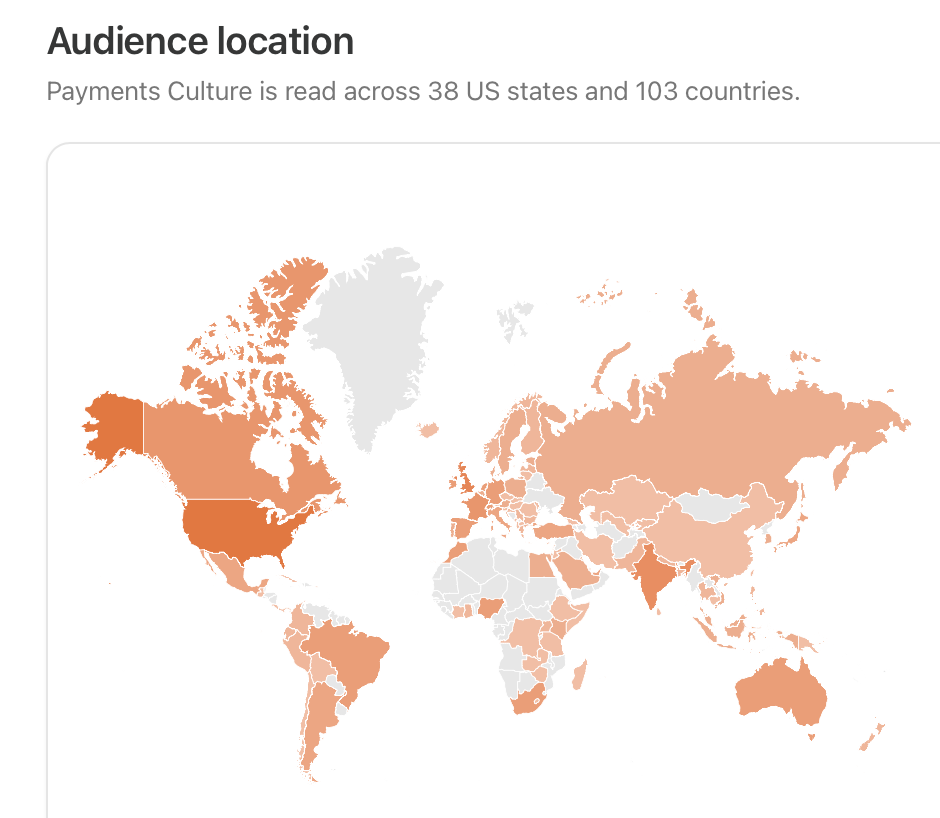Writing about writing after almost two years of writing on Substack
Some reflections so far
Disclaimer: views expressed here are my own and do not represent any other organisation
Substack has made it easier for new writers to get started.
Writing has to be fun. Otherwise, you won’t enjoy it and won’t keep it going.
Knowing what to write about is half of the battle (the other half is consistency).
If you don’t have an editor, then you are the editor - therefore, edit well!
Writing is rewarding, but not in a black-and-white way.
It’s easier than ever to get started
In May 2023, I published my first post on Payments Culture. Almost two years later, this is my 39th post. I wish I'd published more often, but at the same time, I’m happy to have maintained at least some level of consistency. I published something almost every month since December 2023. (All posts can be found here, in the archive.)

I’ve wanted to do a post like this for a while. I’ve wanted to write a post about writing.
But I’m really bad at talking and writing about myself. Perhaps it’s a British thing?
Yet… if you keep thinking about writing about something, then eventually, you need to do it.
It’s obvious but important to say, that before we start writing, we are all readers.
For every high-quality article, blog post, or book that gets published, the author is likely to have read 10x or 100x of the same format. Reading others’ work provides ideas, perspectives, and helps improve one’s writing.
And I’d always been a big reader.
During the COVID lockdowns, sat at home, I read more than ever.
Various Substacks made their way into my daily reading habits and I loved finding new writers on Substack.
While blogging has been around for a long time (since 1994 mas o menos), there was something different about Substack that made everything easier. Easier both for readers to find new writers in all kinds of niches, and at the same time it was easier for writers to get started and give it a go.
After more than 15 years working in fintech and payments, I realised I had ideas and perspectives that I wanted to refine and share. I didn’t have an outlet to write about new ideas in a day-to-day work environment, so I started my Substack.
The reality is that writing freely is rarely possible within an organisation; it’s something you need to do yourself. Fortunately, today, organisations often see writing online as a beneficial skill, as it can help build an audience and credibility in an industry.
Within organisations, a wide range of viewpoints and new ideas often don’t get heard.
This is due to varying degrees of corporate inertia, which often exists regardless of the organisation’s size and sector. Companies settle into what they do, and how they do it, often with a short-sightedness. This myopia means new ideas or perspectives are not explored as much as they should be. (Companies like Stripe are an example of the opposite of this, but such examples are rare.)
Writing provides an avenue to explore ideas and perspectives outside of the structure of any organisation. Today’s always-online world provides a voice for new perspectives to be heard. It may sound easier than it is though, and one thing is key.
It has to be fun!
Writing has to be done for its own enjoyment. Spending hours looking at a screen, typing, and editing isn’t for everyone. Writing a post takes much longer than most people think, and the process isn’t fun if you don’t enjoy it.
Nowadays, many people are trying “writing” by getting AI to do all the work, or at least most of the work. But it’s obvious when you see this, it’s easy to tell. Sure, AI can be used to refine a sentence or give some ideas, but using AI wholesale isn’t writing. Don’t do this.
Writing has to convey personality. There has to be something unique about what you put out there. Could someone else write what you do? If yes, then is it worth putting out there?
It sounds obvious, but writing regularly is harder than it looks. I have a lot of respect for anyone who maintains regular output, especially while keeping the quality at a high level. My goal is to post more often than I have been doing recently.
My goal is to always make my writing accessible. Meaning that you don’t have to be an expert in the field to enjoy reading and to find value in a post. Yet, at the same time, I want to ensure there’s enough interesting commentary and information that even someone well-versed in the field can find it a worthwhile read.
But what are you going to write about?
Writing is primarily about ideas: exploring ideas, critiquing ideas, understanding ideas, expanding ideas, and challenging ideas.
Actually, let’s caveat this.
Much of the writing in the fintech and payments area is more about conveying information than ideas. There are numerous blogs on LinkedIn and Substack whose primary function is to summarise and collate news from other sources. Sometimes, this may come with analysis, but often not.
I have so far avoided this approach! There are enough commentators publishing roundups of the latest fintech and payment news, and I can’t add value doing my own version unless I can do something different. I have considered doing a roundup post of some kind, but I’d want to put my own slant on it and make it interesting enough that it wouldn’t get lost in the noise of everything else doing something similar.
The title of my Substack is a reflection of the fact that fintech doesn’t exist in a vacuum.

Any payment technology evolves from serving the needs of businesses, but also norms, culture, regulation, ways of doing business, and the tech that came before all combine to play an integral part in developing the payment technology we get and use.
One great example of the link between culture and fintech is the question posed on LinkedIn almost weekly: “Is company X building a super app?” However, the question is rarely asked whether or not super-apps actually work in the West, and if not, why not? Some things are not a question of tech but of culture.
With this in mind, if I did start doing a monthly news roundup post on payments and fintech, it would have to include a wider perspective on tech and society, such as the impact of AI, data privacy, and related topics.
My recent post on payments tech in Germany touched on the topic of AI, and going forward, it’s going to become increasingly hard to dissociate payments tech from everything else happening in our fast-changing world.
In every post I put out, I aim to present a combination of information, analysis, and ideas. I’ve written posts with a country specific focus and ones with a technology focus. Yet the most important thing to me - and I’m not saying I’m quite there yet - is to build a distinctive voice, a unique style of my own in some way.
The country or regional-specific posts so far include: Croatia, India, Spain, Japan, Morocco, China, Turkey, Africa, Southeast Asia, Wales, Germany.
If you don’t have an editor, then you are your editor
In the past few months, I listened to a podcast that featured an interview with a writer from The Economist. I can’t find it again, so I can’t quote it precisely. But essentially, the key takeaway was that every article published in The Economist gets seen, reviewed and commented on by 5-10 people. Every single article. The cadence of feedback must be consistent and timely for this to work, given that the newspaper is published weekly. It’s pretty impressive.
The truth is that great writing is more about the editing than it is the writing.
The investor and writer Paul Graham said:
Fancy writing doesn't just conceal ideas. It can also conceal the lack of them. That's why some people write that way, to conceal the fact that they have nothing to say. Whereas writing simply keeps you honest. If you say nothing simply, it will be obvious to everyone, including you.
It seems counterintuitive at first, but it’s much harder to write in simple sentences than longer ones. Try explaining a complex idea in short, simple sentences, and you’ll find that, at first, it’s not easy. It’s harder than writing in long sentences. But once you can explain an idea in short sentences, the output will be better understood, and your writing will be read more widely.

Despite being considered high-brow, even newspapers such as The Financial Times, or The Wall Street Journal, write in predominantly short sentences. The English language rewards writers who can be economical with their words and still convey complex meanings, unlike the German language, which still values wordiness and density.
There’s some famous writing advice by author C.S. Lewis. He wrote, back in 1948, but still highly relevant today:
Always write (and read) with the eye, not the ear. You should see every sentence you write as if it was being heard in secret or never spoken. If it does not look nice, try again.
When writing, regularly re-read every sentence that you’ve written. Read it out loud, or at least out loud in your head. Re-read it all again when you’ve finished your work.
Does it flow well? If something doesn’t sound right for any reason, then redo it and find a way to improve it. At the same time, no matter how much time you spend working on something, you’ll likely never be 100% happy, so set yourself a deadline and go for it.
Writing is rewarding in its own way
My first few posts on Payments Culture had very few readers, but I wanted to keep going regardless. Even if a post led to just a couple of new subscribers, then at least that was some progress.
As a writer, it's great to get feedback. A blog of a couple of thousand words may take 10-20 hours of reading, research, writing and editing, so feedback is valued. Whether from a friend or someone totally new, it’s always rewarding to receive a positive comment. Even negative feedback is good, as it can highlight room for improvement. Still, readers are more likely to stop reading than give negative feedback in most cases.
Often, in our day jobs, we work hard to get appreciation, a bonus, or a promotion, yet these things can take a long time to achieve, and the thanks don’t always arrive as one would hope. With this in mind, writing in the past two years has been more rewarding than any day job. This is due to the feedback loop, the collaborations, and the new people I’ve met and chatted to from writing Payments Culture. I hope this is just the start. The last thing I did that was as rewarding as this was playing in a band a long time ago.
It’s great to network and get to know others interested in this space. I’m always open to chatting, learning from others, and helping each other wherever possible.
One Last Thing
If you want to read something entirely different from Payments Culture, then check out my other Substack, Indonesia in English. Indonesia is the fourth most populous country in the world, yet little is known about it in the West.



I loved this reflective post about writing :-)